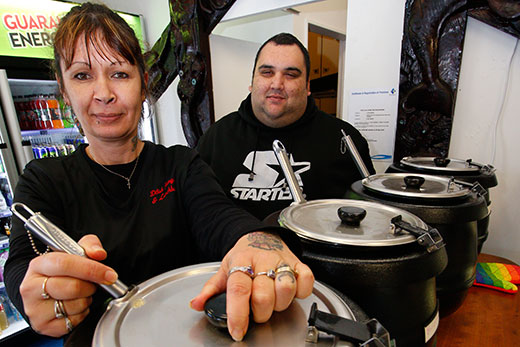Greetings are different in every country. In India, it is with a traditional 'Namaste”, while in Tibet you stick out your tongue in Tibet. If you're in the Philippines, you hold your elder's right hand.
Here in New Zealand, a traditional Maori hongi is given. However, would you be offended if someone pressed their nose to yours and greeted you with a hug when walking into a shop to buy lunch?
Store manager Monique Heke and Pat Spellman. Photo: Bruce Barnard.
Staff at DLish Hangis and Lunchbar at Fraser Cove and Birch Avenue are no longer welcoming their patrons with a hongi and a hug after hearing some customers felt uncomfortable with their greeting.
Company brand manager Pat Spellman says, as a family business, the company are used to dealing with family and staff misinterpreting how comfortable people are with the embrace.
'There was no one incident other than some people didn't take too kindly to being welcomed with hugs and embraced in a Maori way,” says Pat.
'I think it's more of a comfort thing as opposed to anyone being offended by it. But I think once they come to learn that DLish does things a little bit differently, then they'll understand that it wasn't meant to offend anybody.”
Pat, however, says staff are focusing on fine-tuning their customer service approach.
'We've just got to alter the way we approach people and cater to each audience. I think if you read an audience that you think will be comfortable with a hug and a hongi, then by all means go hard.
'But if you feel for whatever reason that they probably wouldn't resonate with that, then probably approach it with a smile and some manners.”
They're still proud of who they are, their values and beliefs.
'You've only got to visit our stores to see there's an obvious Maori flavour,” adds Pat, 'not only to the food but to the experience, where you're welcomed with ‘kia ora' and you're made to feel welcome with the essence of Maori-dom.”
Tauranga Mayor Stuart Crosby isn't Maori, but insists he wouldn't be offended by the traditional greeting. In fact, he embraces the idea.
'If it's people I know who are of Maori descent I quite often give them a hongi in public if I've known them a long time,” says Stuart. 'I greet them that way.”
Rewind 20 years ago and he wouldn't have.
'I would've been intimidated or scared more than anything else about doing it wrong or not understanding,” he adds. 'But obviously in my job I work closely with tangata whenua, so it's just natural for me now.”
Stuart says DLish aren't breaking any rules by sticking to their roots.
'That's their choice and values. If people don't like that they have a choice too. From their perspective I'm sure it's a value they hold strongly and good on them.”
Tauranga's Ellis Bryers, who educates people about Maori cultural practices through his business Mihi Management, doesn't believe the greeting is offensive. But he admits it depends on who the greeting is offered to.
'I fully understand where they're coming from,” says Ellis. 'The staff are just trying to add to the experience of their customers who are buying Maori kai in their shop.”
However, Ellis says in business, the customer is always right and he understands why some customers are ‘uncomfortable' with the traditional greeting.
'The bigger question here may be: ‘Is the shop staff unwillingly ‘pushing' their values onto their clients?
'When the customer has come into their shop for a boil up or hangi, not a hongi, this is probably the part that customers find offensive. No-one likes their freedom of choice taken away.
'The answer lies with how strongly do they feel the need to uphold their values of hongi and hug?”



0 comments
Leave a Comment
You must be logged in to make a comment.